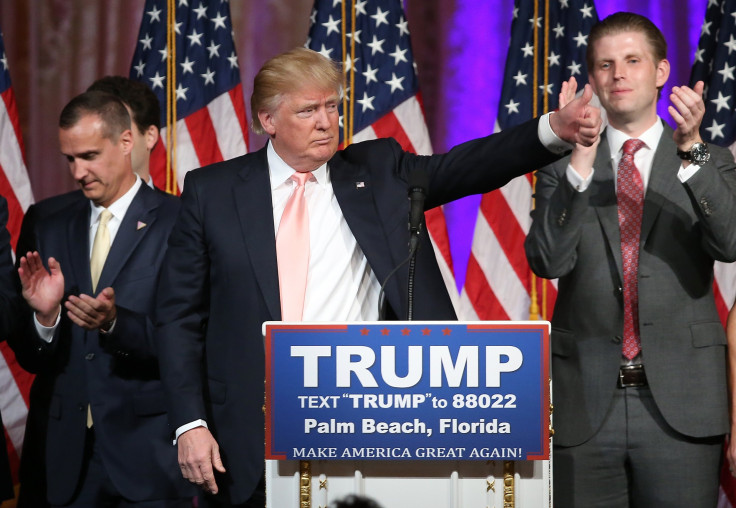Jews And Rabbis Blast Pro-Israel AIPAC Conference Over Donald Trump Appearance

The American Israel Public Affairs Committee (AIPAC), one of the country’s leading pro-Israel lobbying groups, expects some 18,000 people at its annual conference in Washington next week. One of them is Republican presidential front-runner Donald Trump, who is set to address conference attendees on Monday.
And not all Jews are happy about it.
A group of rabbis plans to boycott Trump’s speech, while other American Jews and Jewish organizations have expressed disapproval of Trump’s inclusion at the conference based on his divisive rhetoric and fears over the kind of leader Trump would be if he came into power. A group called Jews Against Trump launched an online petition for AIPAC to rescind its invitation. The Union for Reform Judaism, which represents the Jewish Reform movement (about a third of all Jews in the United states), issued a statement rebuking Trump and his conduct in the campaign.
“Mr. Trump is the unarguable frontrunner for the Republican nomination, and he has not yet spoken clearly about his views on U.S./Israel issues. The AIPAC Policy Conference will give him an opportunity to do so, just as it does for other candidates,” the URJ said in its statement. “At the same time, we cannot ignore the many issues on which Mr. Trump has spoken clearly. ... At every turn, Mr. Trump has chosen to take the low road, sowing seeds of hatred and division in our body politic.”
The organization also said Trump’s rhetoric against Muslims and immigrants is reminiscent of anti-Semitism that put “Jews in deadly danger,” arguing that Jews have a responsibility to speak out when other groups are similarly attacked. But the URJ added that it would engage with Trump at the AIPAC conference “in a way that affirms our nation’s democracy and our most cherished Jewish values.”
If a presidential candidate called for (temporarily) banning Jews from entering the US, would @AIPAC invite them to speak?
— Peter Beinart (@PeterBeinart) March 13, 2016
But others have chosen to disengage altogether. Rabbi Jeffrey Salkin of Hollywood, Florida, is leading a group of about 40 rabbis who plan to boycott Monday’s speech.
“Jewish history teaches that when hatred is unleashed, it takes on a life of its own,” Salkin told the Washington Post. He added that simply boycotting the speech was a more constructive response than “more radical” protest ideas, like shouting during the address or walking out in the middle of the speech.
“Trump’s hateful rhetoric is abhorrent to a great many rabbis, for a variety of reasons,” Salkin wrote in a column for Religion News Service. “We have been urging rabbis to simply not attend the Trump speech and let our absence be felt and noted.”
In a column at Haaretz.com, an Israeli English-language news site, Rabbi Eric Yoffie of Westfield, New Jersey, excoriated the billionaire real estate mogul for both his policies and behavior on the campaign trailer, adding that denouncing a presidential candidate at an AIPAC conference is an unusual but necessary step.
“The delegates to the AIPAC conference are there to cheer on Israel and go out of their way to avoid choosing sides among the political parties or favoring one candidate over another,” wrote Yoffie. “But not this year. American Jews, looking around in stunned disbelief, are concluding that protocol be damned; enough is enough.”
AIPAC has said that the invitation to speak at the conference allows presidential candidates to explain their policy plans regarding Israel in detail. For that reason, other Jewish organizations have said that Trump’s inclusion at AIPAC is necessary.
A moral disgrace. Can you imagine #AIPAC inviting #Trump if he said Jews shouldn't be allowed into this country?!?! https://t.co/KCVhSl5kwE
— Rabbi Latz (@RavMABAY) March 16, 2016
“He won’t just be improvising an answer to a question on a debate stage. This is a planned speech. People are going to be looking to this as his definitive statement on his attitude toward Israel,” Nathan Diament, executive director of public policy for the Orthodox Union, told the Washington Post. “The audience in the room and the audience tuning in will be a sophisticated audience. They’re going to be looking for Trump to be specific. Trump just saying, ‘believe me,’ is not going to be sufficient.”
Trump’s position on Israel has been muddled. He has both questioned Israel’s commitment to peace and affirmed that his administration would be “totally pro-Israel,” while also saying in other speeches that he would act as a neutral broker in the Israel-Palestine conflict. His speech before the Republican Jewish Coalition in December didn’t endear him to all Jews either, as it was laced with stereotypes about the Jewish community.
Daniel Cotzin Burg, a rabbi from Baltimore, wrote in the Times of Israel that Trump’s inclusion at AIPAC, while following a precedent of including all presidential candidates, is a step too far.
“I go to Washington for Policy Conference each year to be inspired — by Israel’s miraculous survival and success, to be informed — by top-tier policy makers and thought-leaders, and to be engaged in the work of deepening the US-Israel alliance,” wrote Burg. “Showing up for Donald Trump is simply not part of that agenda. Does AIPAC really believe it is?”
© Copyright IBTimes 2024. All rights reserved.











